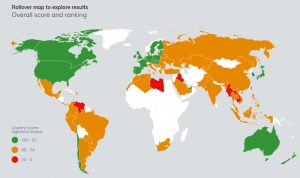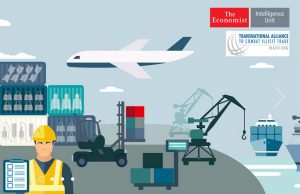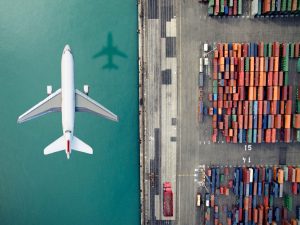Economies around the world are facing the blight of illicit trade, which poses a threat to public health, the environment and innovation, and provides funds for transnational crime networks and terrorist organisations. How equipped are countries to prevent illicit trade?
To measure how nations are addressing the issue of illicit trade, the Transnational Alliance to Combat Illicit Trade (TRACIT) has commissioned The Economist Intelligence Unit to produce the Global Illicit Trade Environment Index, which evaluates 84 economies around the world on their structural capability to protect against illicit trade. The global index expands upon an Asia-specific version originally created by The Economist Intelligence Unit in 2016 to score 17 economies in Asia.
Finland ranks first in the Index with a score of 85.6 (out of 100), just barely ahead of the U.K. The rest of the top 10 includes a handful of European countries (Sweden, Austria, Netherlands, Denmark and Germany), along with the U.S., Australia and New Zealand. At the bottom of the Index ranking is a group of developing economies from all regions of the globe. Libya ranks last with a score of 8.4, and is joined by Iraq in 83rd place, scoring less than six points better. Filling out the bottom ten of the Index are: Myanmar, Laos, Venezuela, Cambodia, Kyrgyzstan, Belize and Ukraine. Regionally, Europe (34 economies in the index), earns the highest the average score (68.0). The Asia-Pacific (21 economies) comes second at 56.0 and the Americas (19 economies), including the U.S. and Canada, is third at 54.0. The Middle East and Africa (10 economies) comes in last, with an average score of 50.0. The Index is constructed on consideration of government policy, supply and demand, transparency and trade, and customs environment.
The Global Illicit Trade Environment Index is based on a similar index that was devised and constructed in 2016 by Chris Clague. The 2018 update and expansion was conducted by Trisha Suresh, Michael Frank, with assistance from Chris Clague. Chris Clague wrote this report, focusing on the overall results, and Scott Aloysius provided research support. It was edited by Amanda Simms.
View the Interactive Index >>
More: https://www.tracit.org/


